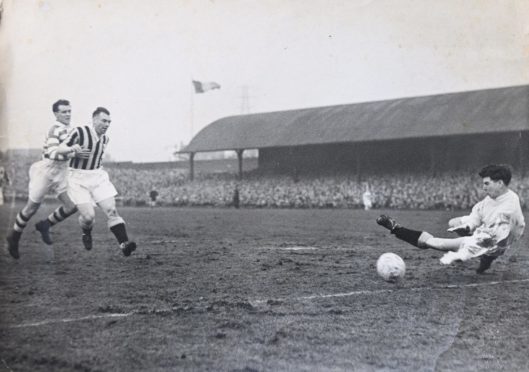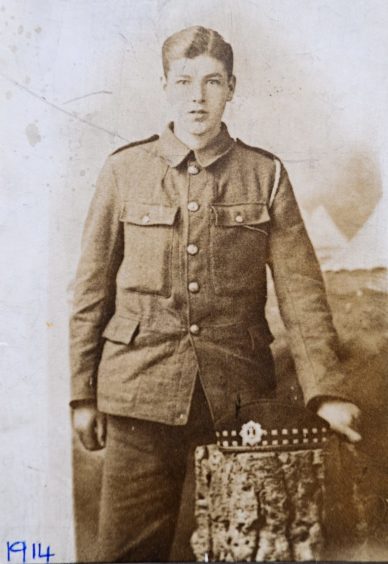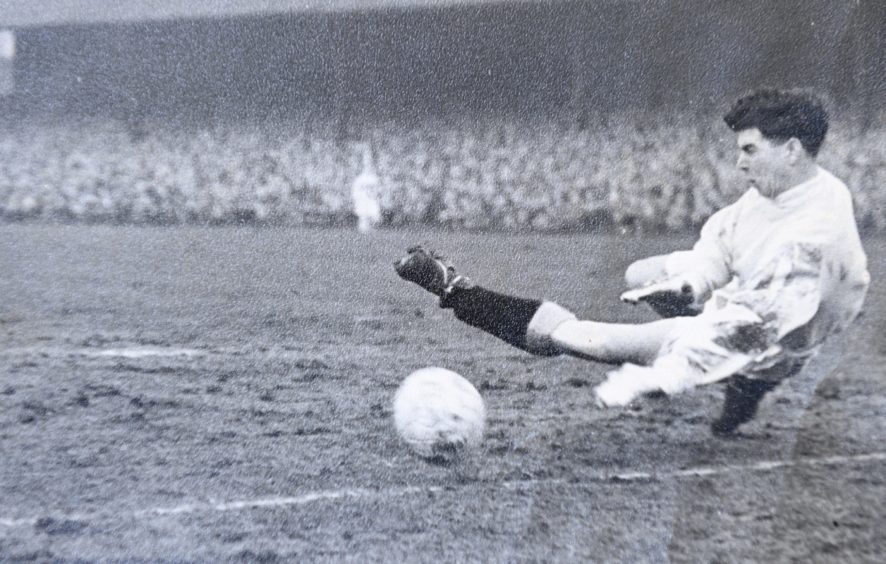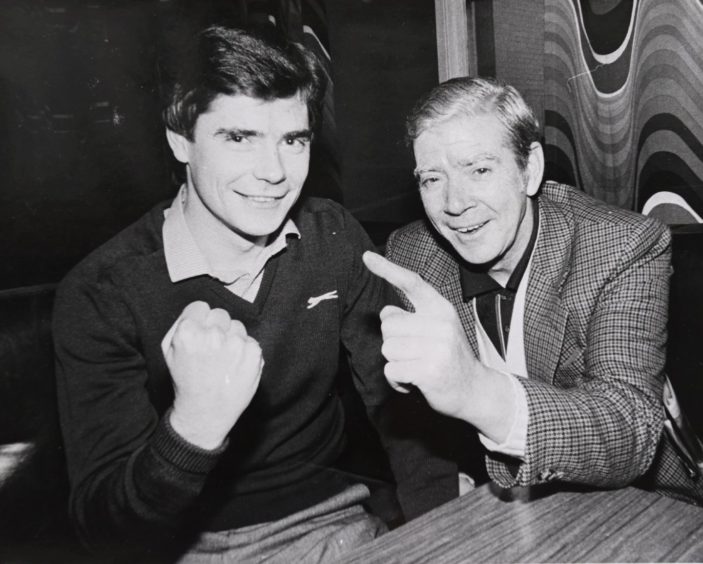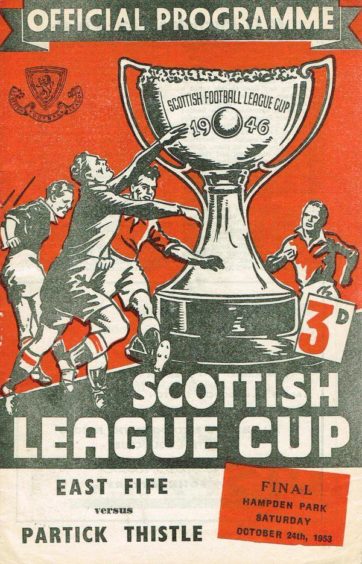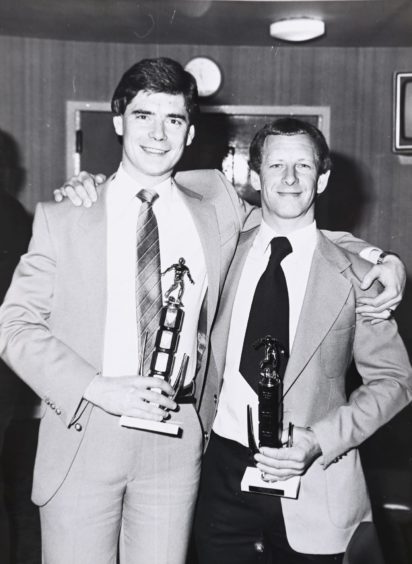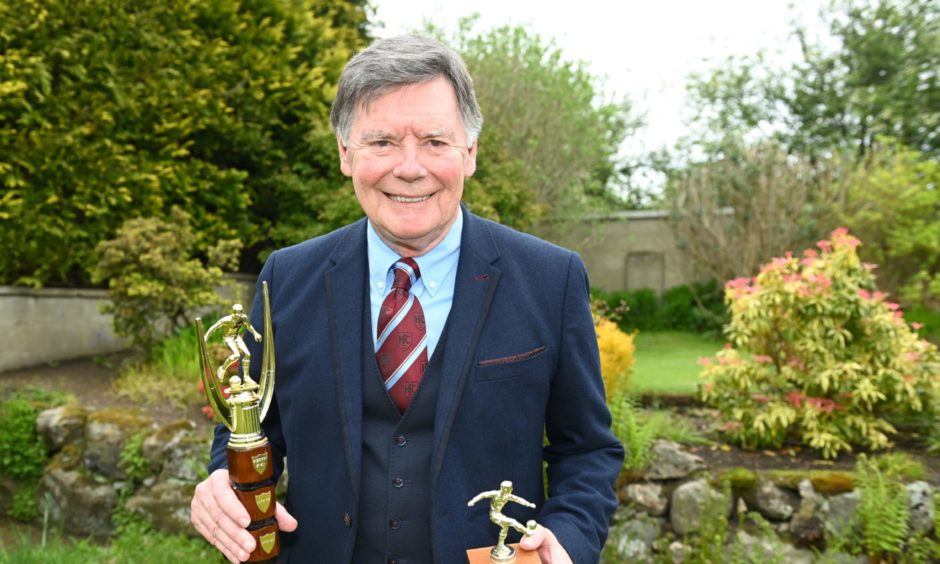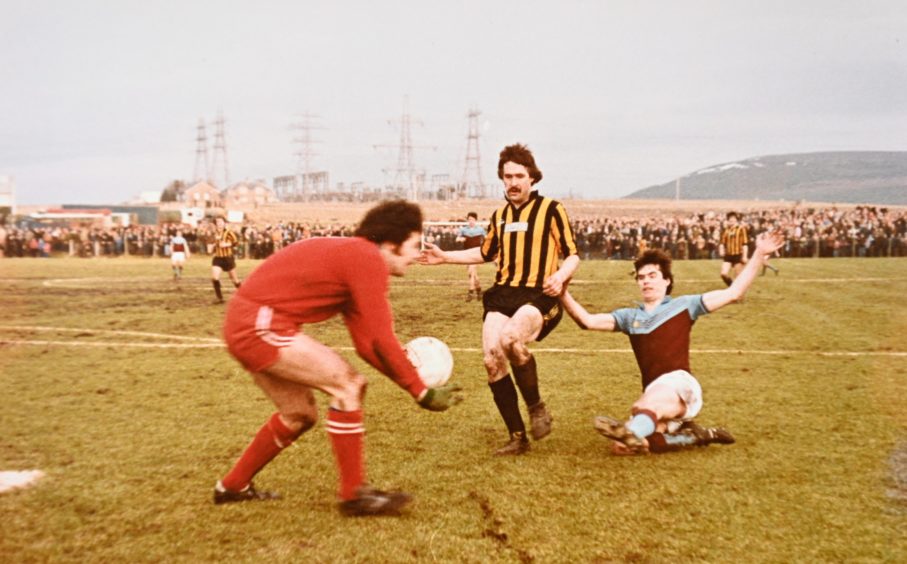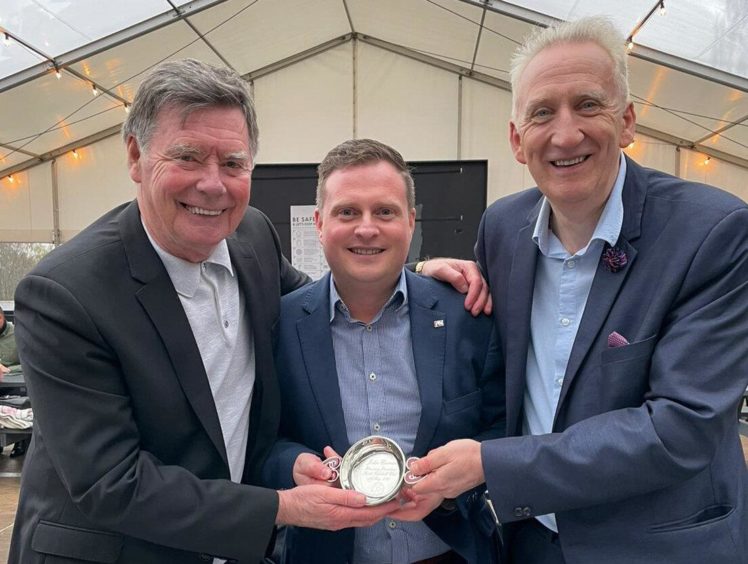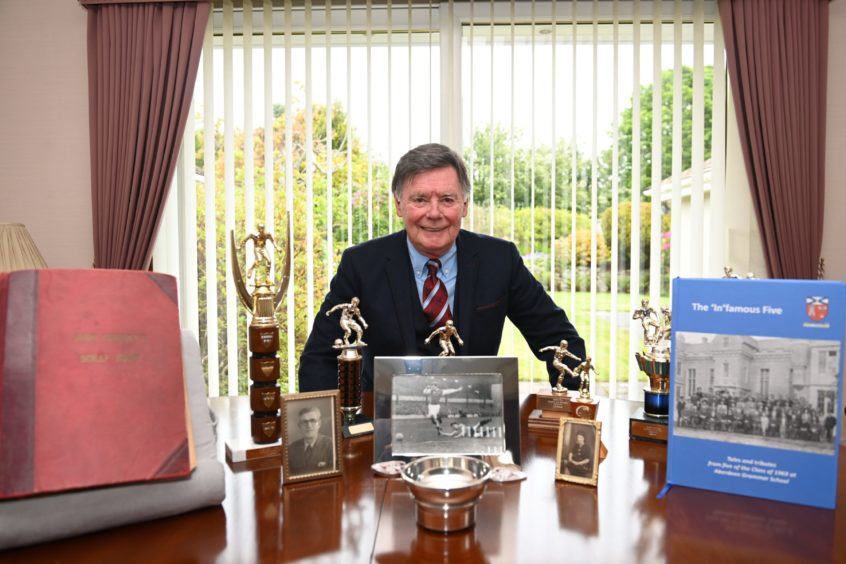It’s a story which features a trio of characters who share the same name and have shown a similar relish for football.
There is the original John Curran who travelled to Philadelphia in the 1920s and became a well-known player in the United States, before he and his pregnant wife embarked on a gruelling trip back across the Atlantic to ensure their son was eligible to represent Scotland.
Then, there’s JC2, who was signed up by Aberdeen’s first championship-winning manager Dave Halliday, enjoyed cup success at East Fife during the 1950s, moved to Watford and subsequently became a stalwart member of Keith FC in the days when they were giants of the Highland League.
And finally, there’s JC3, the man who secured a further string of titles with Keith and has just become honorary president of the club, even as he pursued a career off the pitch and settled down in the Cults area of Aberdeen.
It might sound a complicated scenario, but just remember these fellows have all had a deep passion for the game for the last 100 years – and there is no sign of the sweet music fading for this JC and the Goalline Band.
Memories of a cherished grandfather’s legacy
The Curran clan have never been afraid to expand their horizons or live up to the philosophy that travel broadens the mind.
Mr Curran’s grandfather witnessed the grievous consequences of life in the trenches at The Somme during the First World War, and it influenced his political outlook for the rest of his days – he later worked as a sports journalist for the left-wing Daily Worker newspaper.
But, once the hostilities were over, he made the decision to move his sporting career Stateside – and he did so in the realm of Mare of Easttown.
His grandson recalled: “In the 1970s, just before my Grandma Liz died, after suffering from dementia, she was speaking to me alone in her house in Dixon Road in Cathcart [in Glasgow].
“It became obvious that she thought she was talking to my father, but I didn’t want to correct her, because what she was telling me was fascinating.
She said: “You’re lucky to be Scottish, you know”.
“Why is that, Grandma?”
“Well, the boat only docked two weeks before you were born.”
The family lore is that, upon learning that his young wife was pregnant, Grandpa Jock was hellbent on ensuring that, if the child was a boy, he would be eligible to play for Scotland.
John said: “There were no flights at that time, just a long transatlantic sailing trip.
“And it was a boy. My dad.”
An acclaimed Don who knew his worth
Mr Curran’s father soon established a reputation as a talented goalkeeper, somebody who was ahead of his time after he signed for Queens Park and made his first appearance against Aberdeen in 1948.
He replaced Ronnie Simpson, the future Lisbon Lion, and was in imperious shot-stopping form as the amateur Glasgow club triumphed 3-1.
His son added: “That debut had obviously impressed the Aberdeen manager, David Halliday, because he pursued John and, within a matter of weeks, professional terms were signed.
“As an amateur, my dad had been free to discuss terms with any club who had shown an interest and he had already received offers from [leading English teams] Arsenal, Wolves and Blackpool. But one compelling factor which helped persuade him was the condition he negotiated with Aberdeen which allowed him to complete his apprenticeship as an engineer.”
Then, there was the fact there was no minimum wage in Scotland at the time.
John was always available, even on Christmas Day
The new recruit soon made a positive impact at Pittodrie and was prepared to fling himself into the fray with a whole-hearted exuberance.
He was involved in a friendly match which created its own bit of history when Glenavon’s players and officials travelled to Dyce Airport on two Ulster Aviation Company private charter plans: this was the first occasion when an Irish side had journeyed by air to a match in the British Isles and although it finished goalless, the youngster proved he had a safe pair of hands.
His son added: “One of his most memorable appearances for Aberdeen was against Celtic on Christmas Day in 1948 when the press reports show he delivered an outstanding performance.
“This was all the more remarkable because he had only got the call at 7am on Christmas morning in Aberdeen telling him he had been selected and he had to be in Glasgow in tme for the 3pm kick-off.
“He made it with just 20 minutes to spare.”
Curran even played on his wedding day
However, his life wasn’t all work, even if his devotion to the Dons was exemplary. In 1950, amidst important commitments to Pittodrie, he found the time to marry his sweetheart Eleanor.
Yet, within four hours of the wedding photographs being taken at the registry office, he was back in goal for Aberdeen reserves against their Hearts counterparts and, once again, earning plaudits from the cognoscenti.
There was even talk that he might attain the cherished Scotland cap his father had coveted, although it remained frustratingly out of reach, but Curran’s consistent excellence was one of the main reasons why the Dons escaped from a relegation dogfight in the 1948-49 campaign.
But, despite his relish for Aberdeen and its senior club environs, he was sold on to East Fife, managed by Scot Symon, in 1951 for a fee of £3,000. However, while that might sound like a peculiar move, it was nothing of the sort, given the Methil club’s ambitions and achievements 70 years ago.
Cup success became the norm for the Fifers
Indeed, as his son stated: “East Fife were a force to be reckoned with at that time. There wasn’t the Old Firm dominance that we have lived with for about half a century, apart from a limited break during the [Alex] Ferguson and [Jim] McLean years in the 1980s.
“East Fife regularly challenged for the league championship and came close in the first couple of years my dad was at the club. They had also won the Scottish League Cup twice and reached the Scottish Cup final.
“Crowds were up, they had loads of cash in the bank, and were on top of the world. They also allowed him to acquire his SFA coaching badges, and travelled to Kirkwall in Orkney to carry out a month’s coaching in 1954.
“Another more unusual example was his coaching stints during two close seasons at Butlins in Ayr, where he was photographed demonstrating the art of heading the ball. He was obviously what is now known as a ‘sweeper keeper’, but he was years ahead of his time.”
Curran’s crowning moment at Hampden Park
The apotheosis of the goalie’s career in the Kingdom arrived in October 1953 when East Fife defeated Partick Thistle 3-2 in a thrilling contest to win the Scottish League Cup final at Hampden Park.
His son said: “The team included Jimmy Bonthrone, who went on to manage Aberdeen, and was managed by Jerry Dawson, whom my dad rated highly.
“The press cuttings of the match describe, dramatically, the ebb and flow of the final. I love the cameo about my dad rushing from the field to have his dislocated finger pushed back in.
“He said: ‘Just give me a bullet to bite, Doc’. They bred them tough in these days. And that was definitely the highlight of his time at the club.”
The player moved on to other assignments, across the border, at Shrewsbury Town and latterly a one-year contract at Watford, as the prelude to carving out his own niche in the Highland League in his fourth decade.
Or, as his son described it: “At the age of 34, and with a wife and two young children living back in Aberdeen, he succumbed to the pull of the Highlands and returned to God’s own country.”
Sunshine on Keith for the two Currans
When John Curran returned from Watford, he soon secured employment as an engineer and turner with The Consolidated Pneumatic Tool Company Limited in Tullos in Aberdeen.
But that was only the beginning of another illustrious chapter in his footballing saga, once he had been approached by Keith FC to participate in the Highland League from 1958 onwards.
Expressed simply, he and and colleagues hoovered up honours with a Bunteresque appetite. The Scottish Qualifying Cup was secured for the first time in the club’s history in 1960-61, which brought them a civic reception.
Next, they won the Highland League title in 1961-62 – another unprecedented achievement for the organisation – and, in the Scottish Cup, they comprehensively beat Hamilton Accies 3-0 in 1960 at Kynoch Park.
The indefatigable Curran eventually racked up a total of 215 games over the course of five seasons at Keith and his swansong, in 1963 at the age of nearly 39, yielded an exciting 4-3 victory over Inverness Caley. What a way to go!
But, of course, that was merely the signal for his son, the third of the Johns, to start creating plenty of indelible memories of his own.
A new title for John at his ‘field of dreams’
There was an element of cloak and dagger last month when Keith FC chairman Andy Troup and vice chairman Charlie Simpson, travelled to Aberdeen on the train.
The pretext was to meet up and have lunch with John Curran to celebrate his landmark 70th birthday.
But the main purpose of the journey was to bestow the honour of him becoming honorary president of the club at which he and his father attained so many cherished prizes and precious memories.
John Curran, snr, ended up winning five honours and his son carried on the tradition in 1973, signing from Rothes as the prelude to spending the next nine years as part of an absolutely halcyon period in the club’s history.
There were three successive Highland League Cups, three successive Highland League titles and two Aberdeenshire Cup victories and a player of the year award crammed into 296 games and 87 sparkling goals.
His ‘play anywhere’ attitude saw him don no fewer than nine different numbered jerseys for the club to which he has dedicated decades of service.
Mr Curran said: “I was just about lost for words and blown away when Andy and Charlie asked me to accept this appointment.
“The club, and the people involved, have held a special place in my heart since even before I had the privilege of standing on the left wing at the ‘field of dreams’ during the 1970s and 1980s.
“These were great times I will never forget and I will do all that I can to justify the great honour that the club has seen fit to confer upon me.”
Grassroots sport has suffered a litany of problems during the Covid pandemic. But the continuing efforts of families such as the Currans is a reminder of the positive effects these hardy souls can have on boosting their communities.
